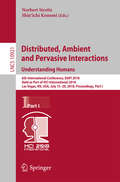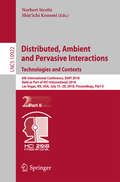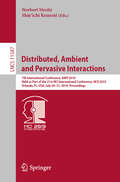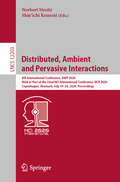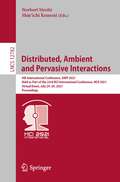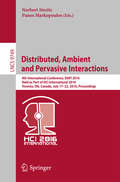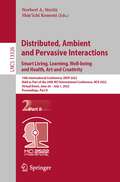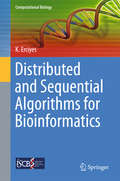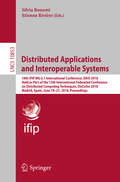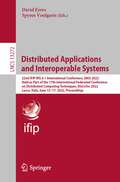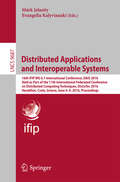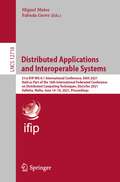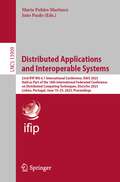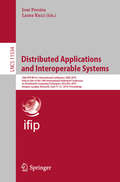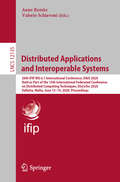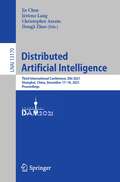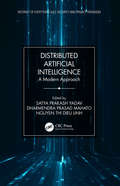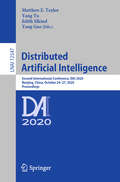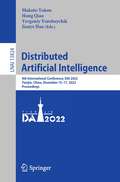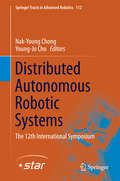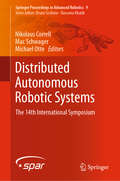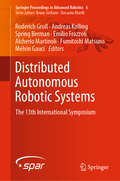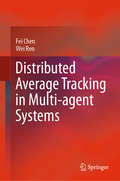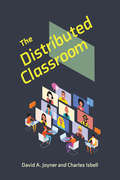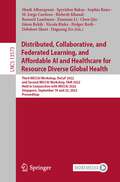- Table View
- List View
Distributed, Ambient and Pervasive Interactions: 6th International Conference, DAPI 2018, Held as Part of HCI International 2018, Las Vegas, NV, USA, July 15–20, 2018, Proceedings, Part I (Lecture Notes in Computer Science #10921)
by Norbert Streitz Shin’ichi KonomiThis two volume set constitutes the refereed proceedings of the 6th International Conference on Distributed, Ambient and Pervasive Interactions, DAPI 2018, held as part of the 20th International Conference on Human-Computer Interaction, HCII 2018, held in Las Vegas, NV, USA in July 2018. The total of 1171 papers and 160 posters presented at the 14 colocated HCII 2018 conferences. The papers were carefully reviewed and selected from 4346 submissions. These papers address the latest research and development efforts and highlight the human aspects of design and use of computing systems. The papers thoroughly cover the entire field of Human-Computer Interaction, addressing major advances in knowledge and effective use of computers in a variety of application areas.. The LNCS 10921 and LNCS 10922 contains papers addressing the following major topics: Technologies and Contexts ( Part I) and Understanding Humans (Part IΙ)
Distributed, Ambient and Pervasive Interactions: 6th International Conference, DAPI 2018, Held as Part of HCI International 2018, Las Vegas, NV, USA, July 15–20, 2018, Proceedings, Part II (Lecture Notes in Computer Science #10922)
by Norbert Streitz Shin’ichi KonomiThis two volume set constitutes the refereed proceedings of the 6th International Conference on Distributed, Ambient and Pervasive Interactions, DAPI 2018, held as part of the 20th International Conference on Human-Computer Interaction, HCII 2018, held in Las Vegas, NV, USA in July 2018. The total of 1171 papers and 160 posters presented at the 14 colocated HCII 2018 conferences. The papers were carefully reviewed and selected from 4346 submissions. These papers address the latest research and development efforts and highlight the human aspects of design and use of computing systems. The papers thoroughly cover the entire field of Human-Computer Interaction, addressing major advances in knowledge and effective use of computers in a variety of application areas..TheLNCS 10921 and LNCS 10922 contains papers addressing the following major topics: Technologies and Contexts ( Part I) and Understanding Humans (Part IΙ)
Distributed, Ambient and Pervasive Interactions: 7th International Conference, DAPI 2019, Held as Part of the 21st HCI International Conference, HCII 2019, Orlando, FL, USA, July 26–31, 2019, Proceedings (Lecture Notes in Computer Science #11587)
by Norbert Streitz Shin’ichi KonomiThis book constitutes the refereed proceedings of the 7th International Conference on Distributed, Ambient and Pervasive Interactions, DAPI 2019, held as part of the 21st International Conference on Human-Computer Interaction, HCII 2019, in Orlando, Florida, USA, in July 2019. A total of 1274 papers and 209 posters have been accepted for publication in the HCII 2019 proceedings from a total of 5029 submissions. The 36 papers included in this volume were organized in topical sections on IoT and big data; smart cities and built environments; perception and emotion in DAPI; and DAPI for health and learning.
Distributed, Ambient and Pervasive Interactions: 8th International Conference, DAPI 2020, Held as Part of the 22nd HCI International Conference, HCII 2020, Copenhagen, Denmark, July 19–24, 2020, Proceedings (Lecture Notes in Computer Science #12203)
by Norbert Streitz Shin’ichi KonomiThis conference proceeding LNCS 12203 constitutes the refereed proceedings of the 12th International Conference on Cross-Cultural Design, CCD 2020, held as part of HCI International 2020 in Copenhagen, Denmark in July 2020.The conference was held virtually due to the corona pandemic. The total of 1439 papers and 238 posters included in the 40 HCII 2020 proceedings volumes was carefully reviewed and selected from 6326 submissions. The regular papers of DAPI 2020, Distributed, Ambient and Pervasive Interactions, presented in this volume were organized in topical sections named: Design Approaches, Methods and Tools, Smart Cities and Landscapes, Well-being, Learning and Culture in Intelligent Environments and much more.
Distributed, Ambient and Pervasive Interactions: 9th International Conference, DAPI 2021, Held as Part of the 23rd HCI International Conference, HCII 2021, Virtual Event, July 24–29, 2021, Proceedings (Lecture Notes in Computer Science #12782)
by Norbert Streitz Shin’ichi KonomiThis conference proceedings LNCS 12782 constitutes the refereed proceedings of the 9 th International Conference on Distributed, Ambient and Pervasive Interactions, DAPI 2021, held as part of the 23rd International Conference, HCI International 2021, which took place in July 2021. The conference was held virtually due to the COVID-19 pandemic.The total of 1276 papers and 241 posters included in the 39 HCII 2021 proceedings volumes was carefully reviewed and selected from 5222 submissions. The papers of DAPI 2021, Distributed, Ambient and Pervasive Interactions, are organized in topical sections named: Smart Cities; IoT, Sensors and Smart Environments; Learning and Culture in Intelligent Environments; Designing Intelligent Environments.
Distributed, Ambient and Pervasive Interactions
by Norbert Streitz Panos MarkopoulosThis book constitutes the refereed proceedings of the 4th International Conference on Distributed, Ambient, and Pervasive Interactions, DAPI 2016, held as part of the 18th International Conference on Human-Computer Interaction, HCII 2016, held in Toronto, ON, Canada, in July 2016 and received a total of 4354 submissions, of which 1287 papers were accepted for publication after a careful reviewing process. These papers address the latest research and development efforts and highlight the human aspects of design and use of computing systems. The papers accepted for presentation thoroughly cover the entire field of human-computer interaction, addressing major advances in knowledge and effective use of computers in a variety of application areas. This volume contains papers addressing the following major topics: designing and developing smart environments; tracking and recognition techniques in ambient intelligence; human behavior in smart environments; emotions and affect in intelligent environments; and smart cities and communities.
Distributed, Ambient and Pervasive Interactions. Smart Living, Learning, Well-being and Health, Art and Creativity: 10th International Conference, DAPI 2022, Held as Part of the 24th HCI International Conference, HCII 2022, Virtual Event, June 26 – July 1, 2022, Proceedings, Part II (Lecture Notes in Computer Science #13326)
by Norbert A. Streitz Shin’ichi KonomiThe two-volume set, LNCS 13325 and 13326, are conference proceedings that constitutes the refereed proceedings of the 10th International Conference on Distributed, Ambient and Pervasive Interactions, DAPI 2022, held as part of the 24th International Conference, HCI International 2022, which took place during June-July 2022. The conference was held virtually due to the COVID-19 pandemic. The 58 papers of DAPI 2022 are organized in topical sections named for each volume: Part I: User Experience and Interaction Design for Smart Ecosystems; Smart Cities, Smart Islands, and Intelligent Urban Living; Smart Artifacts in Smart Environments; and Opportunities and Challenges for the Near Future Smart EnvironmentsPart II: Smart Living in Pervasive IoT Ecosystems; Distributed, Ambient, and Pervasive Education and Learning; Distributed, Ambient, and Pervasive Well-being and Healthcare; and Smart Creativity and Art.
Distributed and Sequential Algorithms for Bioinformatics
by K. ErciyesThis unique textbook/reference presents unified coverage of bioinformatics topics relating to both biological sequences and biological networks, providing an in-depth analysis of cutting-edge distributed algorithms, as well as of relevant sequential algorithms. In addition to introducing the latest algorithms in this area, more than fifteen new distributed algorithms are also proposed. Topics and features: reviews a range of open challenges in biological sequences and networks; describes in detail both sequential and parallel/distributed algorithms for each problem; suggests approaches for distributed algorithms as possible extensions to sequential algorithms, when the distributed algorithms for the topic are scarce; proposes a number of new distributed algorithms in each chapter, to serve as potential starting points for further research; concludes each chapter with self-test exercises, a summary of the key points, a comparison of the algorithms described, and a literature review.
Distributed Applications and Interoperable Systems: 18th IFIP WG 6.1 International Conference, DAIS 2018, Held as Part of the 13th International Federated Conference on Distributed Computing Techniques, DisCoTec 2018, Madrid, Spain, June 18-21, 2018, Proceedings (Lecture Notes in Computer Science #10853)
by Silvia Bonomi Etienne RivièreThis book constitutes the proceedings of the 18th IFIP International Conference on Distributed Applications and Interoperable Systems, DAIS 2018, held in Madrid, Spain, in June 2018. The 10 papers presented together with 2 short papers in this volume were carefully reviewed and selected from 33 submissions. The papers are organized in topical sections on application domains, including stream processing, video dissemination, storage, privacy protection, and large-scale orchestration.
Distributed Applications and Interoperable Systems: 22nd IFIP WG 6.1 International Conference, DAIS 2022, Held as Part of the 17th International Federated Conference on Distributed Computing Techniques, DisCoTec 2022, Lucca, Italy, June 13-17, 2022, Proceedings (Lecture Notes in Computer Science #13272)
by David Eyers Spyros VoulgarisThis book constitutes the refereed proceedings of the 22nd IFIP WG 6.1 International Conference on Distributed Applications and Interoperable Systems, DAIS 2022, held in Lucca, Italy, in June 2022, as part of the 17th International Federated Conference on Distributed Computing Techniques, DisCoTec 2022.The 9 full papers and 2 short papers presented in this book were carefully reviewed and selected from 19 submissions. DAIS addresses all practical and conceptual aspects of distributed applications, including their design, modeling, implementation and operation, the supporting middleware, appropriate software engineering methodologies and tools, as well as experimental studies and applications.
Distributed Applications and Interoperable Systems: 16th IFIP WG 6.1 International Conference, DAIS 2016, Held as Part of the 11th International Federated Conference on Distributed Computing Techniques, DisCoTec 2016, Heraklion, Crete, Greece, June 6-9, 2016, Proceedings (Lecture Notes in Computer Science #9687)
by Márk Jelasity Evangelia KalyvianakiThis book constitutes the proceedings of the 16th IFIP International Conference on Distributed Applications and Interoperable Systems, DAIS 2016, held in Heraklion, Crete, Greece, in June 2016. The 13 papers presented together with 3 short papers in this volume were carefully reviewed and selected from 34 submissions. They represent a compelling sample of the state-of-the-art in the area of distributed applications and interoperable systems. Cloud computing and services received a large emphasis this year.
Distributed Applications and Interoperable Systems: 21st IFIP WG 6.1 International Conference, DAIS 2021, Held as Part of the 16th International Federated Conference on Distributed Computing Techniques, DisCoTec 2021, Valletta, Malta, June 14–18, 2021, Proceedings (Lecture Notes in Computer Science #12718)
by Miguel Matos Fabíola GreveThis book constitutes the refereed proceedings of the 21st IFIP WG 6.1 International Conference on Distributed Applications and Interoperable Systems, DAIS 2021, held in Valletta, Malta, in June 2021, as part of the 16th International Federated Conference on Distributed Computing Techniques, DisCoTec 2021. The 7 regular papers and 3 short papers presented in this book were carefully reviewed and selected from 15 submissions. DAIS addresses all practical and conceptual aspects of distributed applications, including their design, modeling, implementation and operation, the supporting middleware, appropriate software engineering methodologies and tools, as well as experimental studies and applications.
Distributed Applications and Interoperable Systems: 23rd IFIP WG 6.1 International Conference, DAIS 2023, Held as Part of the 18th International Federated Conference on Distributed Computing Techniques, DisCoTec 2023, Lisbon, Portugal, June 19-23, 2023, Proceedings (Lecture Notes in Computer Science #13909)
by Marta Patiño-Martínez João PauloThis book constitutes the refereed proceedings of the 23rd IFIP WG 6.1 International Conference on Distributed Applications and Interoperable Systems, DAIS 2023, held in Lisbon, Portugal, during June 19-23, 2023, as part of the 18th International Federated Conference on Distributed Computing Techniques, DisCoTec 2023. The 7 full papers presented in this book were carefully reviewed and selected from 13 submissions. The papers cover the following topics: distributed algorithms and systems; data management; and distributed architectures.
Distributed Applications and Interoperable Systems: 19th IFIP WG 6.1 International Conference, DAIS 2019, Held as Part of the 14th International Federated Conference on Distributed Computing Techniques, DisCoTec 2019, Kongens Lyngby, Denmark, June 17–21, 2019, Proceedings (Lecture Notes in Computer Science #11534)
by José Pereira Laura RicciThis book constitutes the proceedings of the 19th IFIP International Conference on Distributed Applications and Interoperable Systems, DAIS 2019, held in Kongens Lyngby, Denmark, in June 2019, as part of the 14th International Federated Conference on Distributed Computing Techniques, DisCoTec 2019. The 9 full papers presented together with 2 short papers were carefully reviewed and selected from 28 submissions. The papers addressed challenges in multiple application areas, such as the Internet-of-Things, cloud and edge computing, and mobile systems. Some papers focused on middleware for managing concurrency and consistency in distributed systems, including data replication and transactions.
Distributed Applications and Interoperable Systems: 20th IFIP WG 6.1 International Conference, DAIS 2020, Held as Part of the 15th International Federated Conference on Distributed Computing Techniques, DisCoTec 2020, Valletta, Malta, June 15–19, 2020, Proceedings (Lecture Notes in Computer Science #12135)
by Anne Remke Valerio SchiavoniThis book constitutes the proceedings of the 20th IFIP International Conference on Distributed Applications and Interoperable Systems, DAIS 2020, which was supposed to be held in Valletta, Malta, in June 2020, as part of the 15th International Federated Conference on Distributed Computing Techniques, DisCoTec 2020. The conference was held virtually due to the COVID-19 pandemic. The 10 full papers presented together with 1 short paper and 1 invited paper were carefully reviewed and selected from 17 submissions. The papers addressed challenges in multiple application areas, such as privacy and security, cloud and systems, fault-tolerance and reproducibility, machine learning for systems, and distributed algorithms.
Distributed Artificial Intelligence: Third International Conference, DAI 2021, Shanghai, China, December 17–18, 2021, Proceedings (Lecture Notes in Computer Science #13170)
by Jie Chen Christopher Amato Jérôme Lang Dengji ZhaoThis book constitutes the refereed proceedings of the Third International Conference on Distributed Artificial Intelligence, DAI 2021, held in Shanghai, China, in December 2021.The 15 full papers presented in this book were carefully reviewed and selected from 31 submissions. DAI aims at bringing together international researchers and practitioners in related areas including general AI, multiagent systems, distributed learning, computational game theory, etc., to provide a single, high-profile, internationally renowned forum for research in the theory and practice of distributed AI.
Distributed Artificial Intelligence: A Modern Approach (Internet of Everything (IoE))
by Satya Prakash Yadav, Dharmendra Prasad Mahato, and Nguyen Thi Dieu LinhDistributed Artificial Intelligence (DAI) came to existence as an approach for solving complex learning, planning, and decision-making problems. When we talk about decision making, there may be some meta-heuristic methods where the problem solving may resemble like operation research. But exactly, it is not related completely to management research. The text examines representing and using organizational knowledge in DAI systems, dynamics of computational ecosystems, and communication-free interactions among rational agents. This publication takes a look at conflict-resolution strategies for nonhierarchical distributed agents, constraint-directed negotiation of resource allocations, and plans for multiple agents. Topics included plan verification, generation, and execution, negotiation operators, representation, network management problem, and conflict-resolution paradigms. The manuscript elaborates on negotiating task decomposition and allocation using partial global planning and mechanisms for assessing nonlocal impact of local decisions in distributed planning. The book will attract researchers and practitioners who are working in management and computer science, and industry persons in need of a beginner to advanced understanding of the basic and advanced concepts.
Distributed Artificial Intelligence: Second International Conference, DAI 2020, Nanjing, China, October 24–27, 2020, Proceedings (Lecture Notes in Computer Science #12547)
by Matthew E. Taylor Yang Yu Edith Elkind Yang GaoThis book constitutes the refereed proceedings of the Second International Conference on Distributed Artificial Intelligence, DAI 2020, held in Nanjing, China, in October 2020. The 9 full papers presented in this book were carefully reviewed and selected from 22 submissions. DAI aims at bringing together international researchers and practitioners in related areas including general AI, multiagent systems, distributed learning, computational game theory, etc., to provide a single, high-profile, internationally renowned forum for research in the theory and practice of distributed AI. Due to the Corona pandemic this event was held virtually.
Distributed Artificial Intelligence: 4th International Conference, DAI 2022, Tianjin, China, December 15–17, 2022, Proceedings (Lecture Notes in Computer Science #13824)
by Makoto Yokoo Hong Qiao Yevgeniy Vorobeychik Jianye HaoThis book constitutes the refereed proceedings of the 4th International Conference on Distributed Artificial Intelligence, DAI 2022, held in Tianjin, China, in December 2022. The 5 full papers presented in this book were carefully reviewed and selected from 12 submissions. DAI aims at bringing together international researchers and practitioners in related areas including general AI, multiagent systems, distributed learning, computational game theory, etc., to provide a single, high-profile, internationally renowned forum for research in the theory and practice of distributed AI.
Distributed Autonomous Robotic Systems
by Young-Jo Cho Nak-Young ChongThis volume of proceedings includes 32 original contributions presented at the 12th International Symposium on Distributed Autonomous Robotic Systems (DARS 2014), held in November 2014. The selected papers in this volume are authored by leading researchers from Asia, Australia, Europe, and the Americas, thereby providing a broad coverage and perspective of the state-of-the-art technologies, algorithms, system architectures, and applications in distributed robotic systems.
Distributed Autonomous Robotic Systems: The 10th International Symposium (Springer Proceedings in Advanced Robotics #83)
by Nikolaus Correll Mac Schwager Michael OtteThis volume of the SPAR series brings the proceedings of the fourteen edition of the DARS symposium on Distributed Autonomous Robotic Systems, whose proceedings have been published within SPAR since the past edition. This symposium took place in Boulder, CO from October 15th to 17th, 2018. The volume edited by Nikolaus Correll and Mac Schwager contains 36 scientific contributions cutting across planning, control, design, perception, networking, and optimization, all united through the common thread of distributed robotic systems.
Distributed Autonomous Robotic Systems: The 13th International Symposium (Springer Proceedings In Advanced Robotics Ser. #6)
by Roderich Groß Andreas Kolling Spring Berman Emilio Frazzoli Alcherio Martinoli Fumitoshi Matsuno Melvin GauciDistributed robotics is an interdisciplinary and rapidly growing area, combining research in computer science, communication and control systems, and electrical and mechanical engineering. Distributed robotic systems can autonomously solve complex problems while operating in highly unstructured real-world environments. They are expected to play a major role in addressing future societal needs, for example, by improving environmental impact assessment, food supply, transportation, manufacturing, security, and emergency and rescue services. The goal of the International Symposium on Distributed Autonomous Robotic Systems (DARS) is to provide a forum for scientific advances in the theory and practice of distributed autonomous robotic systems. This volume of proceedings include 47 original contributions presented at the 13th International Symposium on Distributed Autonomous Robotic Systems (DARS 2016), which was held at the Natural History Museum in London, UK, from November 7th to 9th, 2016. The selected papers in this volume are authored by leading researchers from around the world, thereby providing a broad coverage and perspective of the state-of-the-art technologies, algorithms, system architectures, and applications in distributed robotic systems. The book is organized into seven parts, representative of critical long-term and emerging research thrusts in the multi-robot community: Distributed Coverage and Exploration; Multi-Robot Control; Multi-Robot Estimation; Multi-Robot Planning; Modular Robots and Smart Materials; Swarm Robotics; and Multi-Robot Systems in Applications.
Distributed Average Tracking in Multi-agent Systems
by Fei Chen Wei RenThis book presents a systematic study of an emerging field in the development of multi-agent systems. In a wide spectrum of applications, it is now common to see that multiple agents work cooperatively to accomplish a complex task. The book assists the implementation of such applications by promoting the ability of multi-agent systems to track — using local communication only — the mean value of signals of interest, even when these change rapidly with time and when no individual agent has direct access to the average signal across the whole team; for example, when a better estimation/control performance of multi-robot systems has to be guaranteed, it is desirable for each robot to compute or track the averaged changing measurements of all the robots at any time by communicating with only local neighboring robots. The book covers three factors in successful distributed average tracking: algorithm design via nonsmooth and extended PI control;distributed average tracking for double-integrator, general-linear, Euler–Lagrange, and input-saturated dynamics; andapplications in dynamic region-following formation control and distributed convex optimization. The book presents both the theory and applications in a general but self-contained manner, making it easy to follow for newcomers to the topic. The content presented fosters research advances in distributed average tracking and inspires future research directions in the field in academia and industry.
The Distributed Classroom (Learning in Large-Scale Environments)
by David Joyner Charles IsbellA vision of the future of education in which the classroom experience is distributed across space and time without compromising learning.What if there were a model for learning in which the classroom experience was distributed across space and time--and students could still have the benefits of the traditional classroom, even if they can't be present physically or learn synchronously? In this book, two experts in online learning envision a future in which education from kindergarten through graduate school need not be tethered to a single physical classroom. The distributed classroom would neither sacrifice students' social learning experience nor require massive development resources. It goes beyond hybrid learning, so ubiquitous during the COVID-19 pandemic, and MOOCs, so trendy a few years ago, to reimagine the classroom itself. David Joyner and Charles Isbell, both of Georgia Tech, explain how recent developments, including distance learning and learning management systems, have paved the way for the distributed classroom. They propose that we dispense with the dichotomy between online and traditional education, and the assumption that online learning is necessarily inferior. They describe the distributed classroom's various delivery modes for in-person students, remote synchronous students, and remote asynchronous students; the goal would be a symmetry of experiences, with both students and teachers able to move from one mode to another. With The Distributed Classroom, Joyner and Isbell offer an optimistic, learner-centric view of the future of education, in which every person on earth is turned into a potential learner as barriers of cost, geography, and synchronicity disappear.
Distributed, Collaborative, and Federated Learning, and Affordable AI and Healthcare for Resource Diverse Global Health: Third MICCAI Workshop, DeCaF 2022, and Second MICCAI Workshop, FAIR 2022, Held in Conjunction with MICCAI 2022, Singapore, September 18 and 22, 2022, Proceedings (Lecture Notes in Computer Science #13573)
by Shadi Albarqouni Spyridon Bakas Sophia Bano M. Jorge Cardoso Bishesh Khanal Bennett Landman Xiaoxiao Li Chen Qin Islem Rekik Nicola Rieke Holger Roth Debdoot Sheet Daguang XuThis book constitutes the refereed proceedings of the Third MICCAI Workshop on Distributed, Collaborative, and Federated Learning, DeCaF 2022, and the Second MICCAI Workshop on Affordable AI and Healthcare, FAIR 2022, held in conjunction with MICCAI 2022, in Singapore in September 2022. FAIR 2022 was held as a hybrid event.DeCaF 2022 accepted 14 papers from the 18 submissions received. The workshop aims at creating a scientific discussion focusing on the comparison, evaluation, and discussion of methodological advancement and practical ideas about machine learning applied to problems where data cannot be stored in centralized databases or where information privacy is a priority. For FAIR 2022, 4 papers from 9 submissions were accepted for publication. The topics of the accepted submissions focus on deep ultrasound segmentation, portable OCT image quality enhancement, self-attention deep networks and knowledge distillation in low-regime setting.
